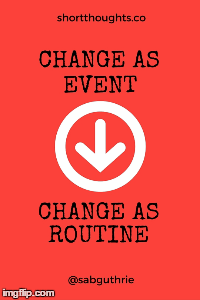In the book Outliers, author Malcolm Gladwell says it takes 10,000 hours of practice to master a topic. This stat is often misused.
There’s a belief that learning is only time driven; not activity led. You can’t expect to sit behind a desk, do the same tasks for five years then get up from the desk an expert.
Albert Einstein defined insanity as “doing the same thing over and over again and expecting different results”.
Learning is a process. It starts with awareness and needs practice and reflection. Here’s one learning model. It relates to the psychological states involved in the process of progressing from incompetence to competence in a skill.

1. Unconscious incompetent
I’m not aware of the existence, let alone relevance, of the skill area. So, I don’t know I have any deficiency
Sometimes I deny the relevance or usefulness of the new skill
Something must ‘click’. I must become conscious of my incompetence along with the value of the new skill, before moving on to the next stage of learning
2. conscious incompetence
Now I’m aware of the existence and relevance of the skill
I’m also now aware of my deficiency in this area by trying to use the skill. This trial and error can be integral to the learning process at this stage
I realise that by improving my skill or ability in this area my effectiveness will improve
Ideally I can measure the extent of my deficiency in the relevant skill, and measure what level of skill is required for my own competence
3. conscious competent
I’m getting somewhere. I understand, or know how, to do something. But it isn’t easy
Demonstrating the skill or knowledge requires concentration
I really have to think about executing the new skill but I can do it without assistance
4 - unconscious competence
I’ve practiced so much the skill has entered the unconscious parts of my brain - it becomes ‘second nature’
I can do this skill while doing something else
I could probably teach someone my new skill too - but I may find it hard to articulate how to do it. The skill has become innate.
These are short thoughts. For longer, more fully-formed thoughts covering business, public relations and change visit www.sabguthrie.info or sign up to email updates.

![In the book Outliers, author Malcolm Gladwell says it takes 10,000 hours of practice to master a topic. This stat is often misused.
[[MORE]]There’s a belief that learning is only time driven; not activity led. You can’t expect to sit behind a desk,...](https://64.media.tumblr.com/1aa4f9f74e1b90063af2420d7339d729/tumblr_nvhampTYyx1uxr35ho1_1280.jpg)

![“Knowledge is power” runs the cliché. But in the industrial age of command and control hierarchy this line meant: guard knowledge; hoard it. Be a knowledge miser.
[[MORE]]Having a head full of knowledge made you indispensable to your organisation.
In...](https://64.media.tumblr.com/bdf1a92dad9681db31bbdd85946cfd38/tumblr_nw3fthy7bO1uxr35ho1_540.jpg)
![Hierarchical management is bad for business. Command and control works well in bureaucratic organisations operating in slow moving, stable industries where firms can concentrate on looking inwards to driving out inefficiencies.
[[MORE]]Seen any...](https://64.media.tumblr.com/402071edd46605cb05e6afbcc7930acc/tumblr_nvxu5vwUO21uxr35ho1_1280.jpg)

![Managers have moved from knowledge hoarders to knowledge pumps. The moniker: ‘knowledge is power’ is being replaced with ‘power belongs to the network’.
[[MORE]]Writing in the Harvard Business Review Jeremy Heimans and Henry Timms describe a growing...](https://64.media.tumblr.com/ca74bac0cbb7000ead217ec01e13af53/tumblr_nwk2bzEUVY1uxr35ho1_540.jpg)

![At work we often don’t have enough information from which to build an accurate picture. But we’re programmed to make meaning where there is none.
[[MORE]]Information contradicting cherished beliefs can be disturbing. When we feel threatened we draw...](https://64.media.tumblr.com/29c482e47b7901befcadd340951f4faa/tumblr_nwvc9iL0Gq1uxr35ho1_540.jpg)


